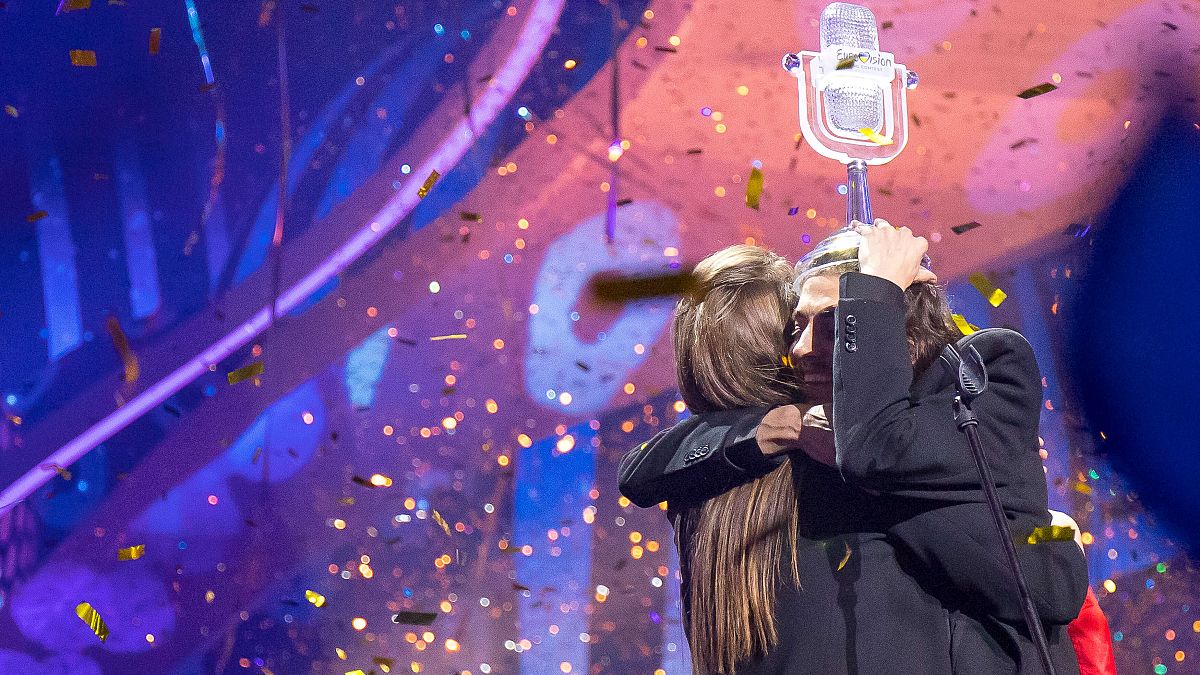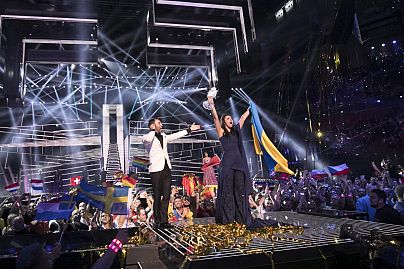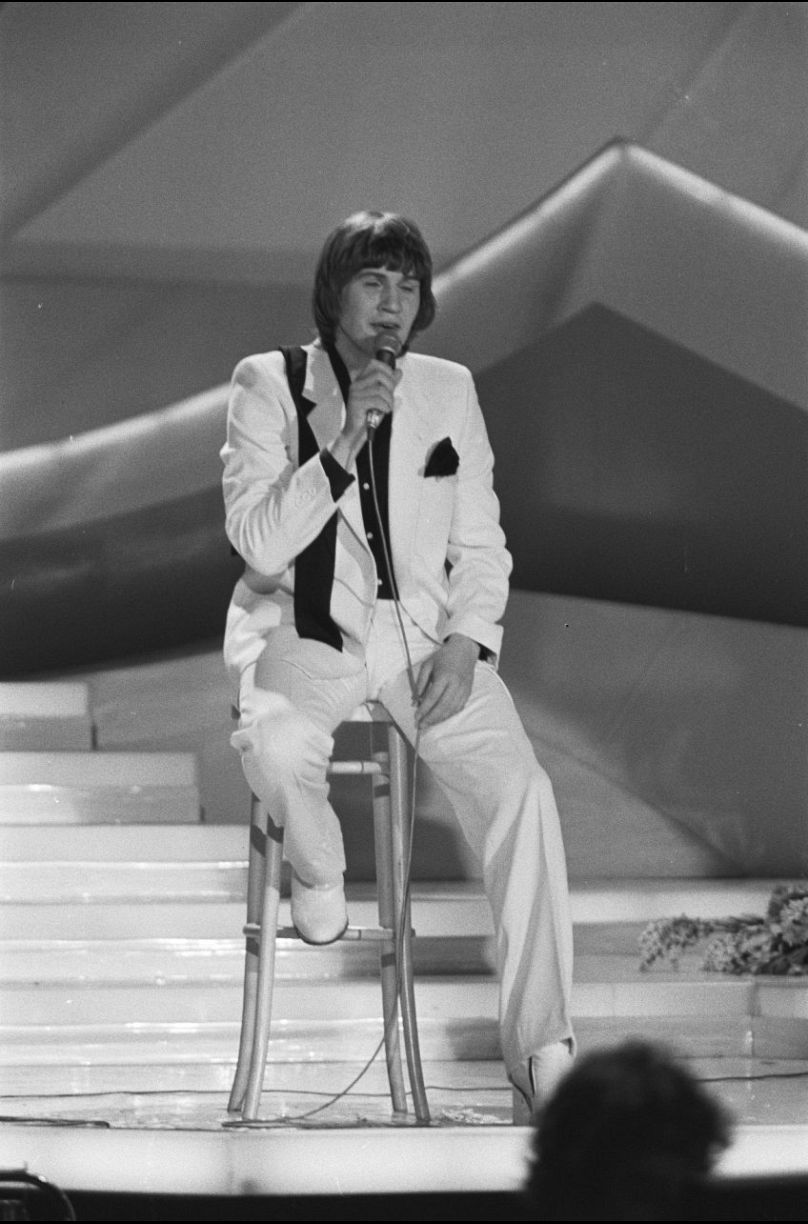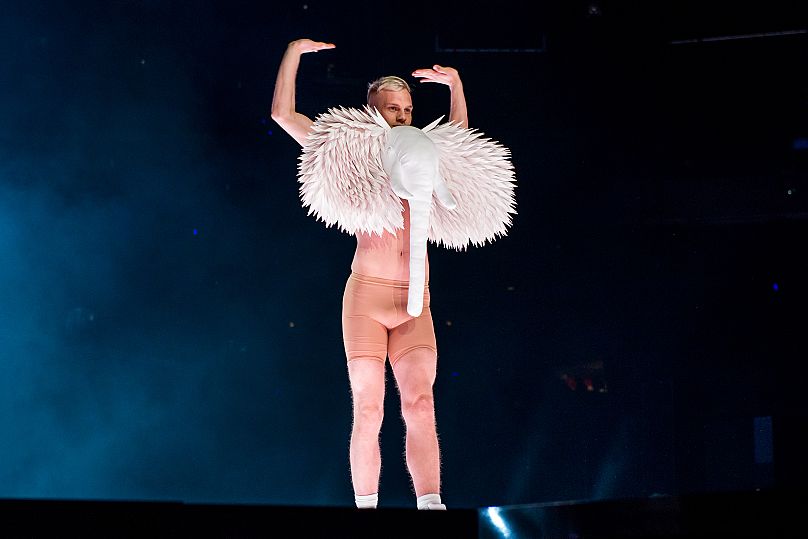What do you need to take home the prize from the battlefield that is the Eurovision Song Contest? Euronews investigates.
Is there a formula to what makes a Eurovision Song Contest winner? Pop acts singing in English and delivering a powerful build up that leads to an addictive chorus, seemed to have cornered the market for a while. Euronews talked to an award-winning singer, an award-winning producer and a fan, and it turns out perhaps things are not that simple.
Last year's winner was not the expected anthem of kitsch, but quite a sober ballad. The year before, victory went to '1944', a song about the Stalin’s deportation of Crimean Tatars.
While Portugal's Salvador Sobral won last year singing "Amar pelos dois" (Love for both) in Portuguese, in 2016, Ukraine's Jamala belted out her lyrics in English and Crimean Tatar.
Both acts are dramatically different from former winners, such as Boom-Bang-a-Bang or Diggi-loo diggi-ley - yes, these are real titles- who won for the UK in 1969 and for Sweden in 1985 respectively.
Despite the exceptions, the Eurovision Song Contest seems forever connected to groups such as ABBA or singers like Céline Dion. There must be some sort of pop formula to it. Right?
No formula for Logan
"That is bullshit," says Johnny Logan, three times winner for Ireland.
"I absolutely do not believe in the existence of a Eurovision song formula and, to be honest, I think my first song sold millions because the lyrics were written from the heart. There was something in-depth to it and not just a formula."
Logan, whose actual name is Séan Patrick Sherrard, was 26 when he gave Ireland its second victory with "What's Another Year", 10 years after Dana sealed the deal for the country the first time. Since then, Ireland became somewhat of a Eurovision champion, with 7 victories, nearly half of them thanks to Logan.
"I've heard many theories about strategies to win," Logan told Euronews.
"One is that positioning really matters, like, you can't be one of the last ones nor one of the first ones on stage."
Logan, who was the only singer in the history of the contest to win it three times, believes the only thing for a writer to focus on is to create a song that is "unique and not just formatted for the competition".
An opinion not far from Anton Hård af Segerstad's, the Swedish music composer and producer behind Måns Zelmerlöw victory in 2015 with "Heroes". The delightful English-language pop act was a favourite from day one.
"We didn't write the song with Eurovision in mind. We just wanted to write a good song. We were jamming and things just happened and we let creativity flow," he said
Be that as it may, the song had all the stuff that is usually needed to make it on this arena: a positive vibe, catchy lyrics, and it was totally easy to dance.
The key is "everything"
Segerstad produced a song in a different era at the Eurovision. Stages got bigger and technology took over.
Since 1999, the orchestra stopped being used. Rules are different. Maybe there is no formula, but it seems some aspects cannot be ignored if you want to bag the prize.
Speaking about some of the vital ingredients, the Swedish producer said: "I would say you must right fantastic lyrics and to put your ideas in verse in a great way. The song cannot be just OK; it has to be great. And no, an appealing chorus is not the key. Everything is the key."
"A really bad song cannot be saved with a fantastic chorus," says Segerstad. "A really bad artist can't perform greatly even with a great song with great lyrics."
"I would say the song is 30%. Back in 2015, Måns was 30% and the rest was the music, the stage and his performance life. The combination of all that was key, I think."
Johnny Logan was successful the pre-social media era. He insists that what was really important was to stand out.
"You have so many countries and so many songs that you must know how to make your song stand out from the crowd.
The important thing is to create "a melody that means something for people," he said.
"The melody is important because people will remember it forever, if the song is good. When I talk to people about my songs from Eurovision, I find these songs as popular now as they were when we won."
A "singer's song"
Johnny Logan says the songs Ireland sent to Eurovision during the years it kept on winning were "singer's songs." Songs written with soul, "where music is all that matters" and not the 12 points.
Logan thinks Salvador Sobral’a song was also a singer’s song. "Just like the song that came second the year Conchita Wurst won, the Dutch song, a beautiful song" - "Calm After The Storm" by The Common Linnets.
"Because music is passion and music is here to enhance your life, it is not something like food and water....
If you win the Eurovision with some rubbish, the song is not going to do a lot for your career, which will eventually end. To all these theorists of the Eurovision song formula out there, I would tell them to get a life."
The power of the chorus
Benoît Blaszczyk is a true ‘eurofan’. The 49-year-old Frenchman is in fact the secretary of the General Organization of Eurovision Fans in France (OGAE). It is one of the biggest such groups.
"I don't believe in that idea of having a formula to win Eurovision. If there was such a formula, everybody would follow it and it would be easy to win. We need great musicality and a great chorus."
Blaszczyk shares the opinion of many of his peers about the importance of the chorus.
"I believe in the power of chorus. It must stay in your head and that must happen fast,” he said.
Though it’s easy to find all the songs on YouTube from early March, the general audience only hears it for the first time during finals of the contest.
“which means they listen to it for three minutes maximum,”he added. “That's it."
Do not repeat formulas
"Countries need to understand that repeating last year's formula to try and win the following year is never a great option," says the Eurovision expert.
"The voting preferences change every year and everything depends on the other competitors. People want different songs all the time."
Blaszczyk, like many Eurovision fans, dislikes the dominance of English in the contest.
"I believe in language diversity. Despite the fact that famous winners sang in English, such as ABBA, from Sweden, I think it is important to listen to all the languages."
Maybe it's not the music at all
English or no English? To have an orchestra or not? And how will the ever so criticized geopolitical vote swing? Maybe we should weight up all of this before even thinking of what makes a good song or if there is an actual formula.
Since the very beginning of the contest, political voting has been a major issue and the thing the contest is perhaps best known for.
Western countries often complain of how neighbours in the east tend to favour each other - which is true - but they forget they too can often count on the friendly next-door-vote; be that from Scandinavia to the Benelux, or between Greece and Cyprus, and French speaking countries.
So why should Croatia, Slovenia and Bosnia feel bad? Or Azerbeijan, Russia and Moldova?
Maybe the real formula truly is just a good song.



